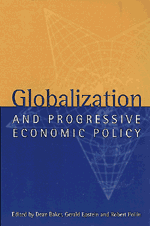Book contents
- Frontmatter
- Contents
- List of figures
- List of tables
- List of contributors
- Editors' acknowledgments
- 1 Introduction
- I The IMF, the World Bank, and neo-liberalism
- II Foreign direct investment, globalization, and neo-liberalism
- III Globalization of finance
- 6 Implications of globalization for macroeconomic theory and policy in developing countries
- Comment by Robert Blecker
- 7 Asia and the crisis of financial globalization
- Comment by Sule Ozler
- 8 Globalization and financial systems: policies for the new environment
- Comment by Ilene Grabel
- 9 Housing finance in the age of globalization: from social housing to life-cycle risk
- Comment by Jane D'Arista
- IV Trade, wages and the environment: North and South
- V Migration of people in a global economy
- VI Globalization and macroeconomic policy
- Bibliography
- Index
7 - Asia and the crisis of financial globalization
Published online by Cambridge University Press: 04 August 2010
- Frontmatter
- Contents
- List of figures
- List of tables
- List of contributors
- Editors' acknowledgments
- 1 Introduction
- I The IMF, the World Bank, and neo-liberalism
- II Foreign direct investment, globalization, and neo-liberalism
- III Globalization of finance
- 6 Implications of globalization for macroeconomic theory and policy in developing countries
- Comment by Robert Blecker
- 7 Asia and the crisis of financial globalization
- Comment by Sule Ozler
- 8 Globalization and financial systems: policies for the new environment
- Comment by Ilene Grabel
- 9 Housing finance in the age of globalization: from social housing to life-cycle risk
- Comment by Jane D'Arista
- IV Trade, wages and the environment: North and South
- V Migration of people in a global economy
- VI Globalization and macroeconomic policy
- Bibliography
- Index
Summary
Reflecting views then dominant among Anglo-Saxon economists, the Bretton Woods Accords were devised around the basic thesis that free international capital mobility is incompatible with the preservation of reasonably free trade and full employment. The displacement of the Bretton Woods pegged exchange rate regime in the 1970s with floating rates has, however, been paralleled by the displacement of the old orthodoxy by a new one, which holds that free capital mobility is essential for maximizing the global welfare benefits from international trade and investment. Thus, rationalized by economic “science,” the U.S., with the International Monetary Fund (IMF) and World Bank as pliant instruments, has been aggressively promoting financial market deregulation and the lifting of capital controls throughout the globe.
This chapter contends, however, that the Bretton Woods incompatibility thesis remains valid. None of the major benefits claimed by the current orthodoxy has been realized. Lifting capital controls has greatly increased the frequency of currency crises and cost-sharing inequities between developed and less-developed economies during crisis management. The general claim that deregulating financial markets produces more economically correct pricing of capital assets and credit allocation has little theoretical standing and has been falsified by experience. The global integration of financial markets has adversely impacted First as well as Third World economies and has retarded the global expansion of output and trade. The policy implication is that curbing the international mobility of financial capital is more than ever a basic requisite for smoothing international economic interchange, and for more stable and equitable First and Third world economies.
- Type
- Chapter
- Information
- Globalization and Progressive Economic Policy , pp. 163 - 191Publisher: Cambridge University PressPrint publication year: 1998
- 17
- Cited by



